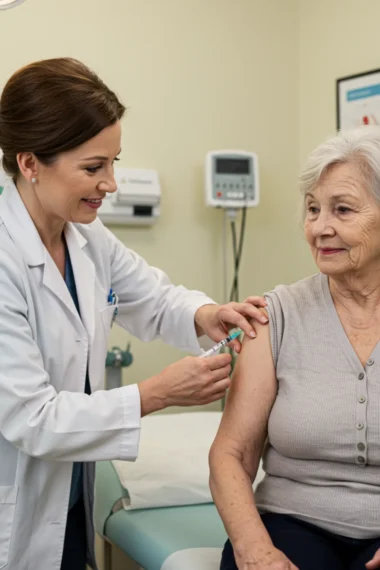How To Boost Immune Health With Diet As a Senior?
According to the National Institute on Aging (NIA), the immune system naturally becomes less efficient with age, a process known as immunosenescence. This means older adults are more vulnerable to infections, slower recovery, and even reduced vaccine effectiveness. In fact, adults over 65 account for nearly 70% of seasonal flu-related hospitalizations in the U.S., based on CDC reports.
While we can’t stop aging, we can slow down its effects by giving the immune system the fuel it needs. Nutrition plays a powerful role in building resistance, fighting inflammation, and maintaining energy levels.
How Aging Affects the Immune System?
To understand why diet is so important, let’s first break down the changes that happen as we age:
- Slower immune response – White blood cells respond less quickly to threats.
- Lower antibody production – Vaccines and infections don’t trigger as strong a defense.
- Inflammation – Chronic low-grade inflammation (“inflammaging”) increases risk of diseases.
- Digestive changes – Reduced stomach acid affects nutrient absorption, especially B12, calcium, and iron.
These factors make nutrition more critical than ever in senior years.
Key Nutrients Seniors Need for Strong Immunity
To boost immune health with diet, seniors should prioritize foods rich in these nutrients:
1. Vitamin C – The Infection Fighter
Vitamin C supports white blood cell production, speeds up wound healing, and acts as an antioxidant.
- Best food sources: Oranges, kiwi, bell peppers, strawberries, and broccoli.
- Daily need for seniors: 75 mg (women), 90 mg (men).
One medium orange contains ~70 mg of vitamin C—almost enough for the day!
2. Vitamin D – The Sunshine Nutrient
Vitamin D helps regulate immune responses and reduces respiratory infections. Deficiency is common in seniors because skin produces less vitamin D with age.
- Best food sources: Fatty fish (salmon, mackerel), fortified milk, mushrooms, egg yolks.
- Daily need: 600–800 IU (older adults often need supplements after testing).
3. Zinc – The Healing Mineral
Zinc plays a role in wound repair and activating immune cells. Deficiency increases infection risk.
- Best food sources: Pumpkin seeds, oysters, beef, lentils, and chickpeas.
- Daily need: 8 mg (women), 11 mg (men).
Learn More: ACME Markets Senior Discount
4. Protein – The Muscle & Antibody Builder
Adequate protein is crucial for repairing tissues, producing antibodies, and preventing muscle loss (sarcopenia).

- Best food sources: Lean chicken, eggs, Greek yogurt, beans, and tofu.
- Daily need: About 1.0–1.2 grams per kilogram of body weight for seniors.
5. Omega-3 Fatty Acids – The Inflammation Reducer
Omega-3s reduce chronic inflammation and improve cardiovascular and brain health.
- Best food sources: Salmon, sardines, chia seeds, flaxseeds, walnuts.
- Daily need: 250–500 mg of EPA and DHA combined.
6. Vitamin B12 – The Energy Booster
Older adults often struggle with B12 absorption, leading to fatigue, weakness, and cognitive decline.
- Best food sources: Fish, dairy, fortified cereals, and supplements (if needed).
- Daily need: 2.4 mcg.
7. Probiotics & Fiber – Gut Health = Immune Health
Nearly 70% of immune function lives in the gut. A healthy microbiome supports strong immunity.
- Best food sources: Yogurt, kefir, sauerkraut, kimchi (probiotics); oats, apples, beans, and whole grains (fiber).
Immune-Boosting Foods Seniors Should Eat Every Week
Here’s a practical food list seniors can include in their meals:
- Citrus fruits (oranges, grapefruit, mandarins) – rich in vitamin C.
- Leafy greens (spinach, kale) – high in folate and antioxidants.
- Berries (blueberries, strawberries) – loaded with antioxidants.
- Nuts & seeds (almonds, sunflower seeds, chia) – vitamin E and healthy fats.
- Lean protein (chicken, eggs, beans) – builds immune cells.
- Fish (salmon, sardines) – omega-3s for inflammation control.
- Fermented foods (yogurt, kefir) – gut-friendly probiotics.
- Green tea – rich in polyphenols that support immunity.
Learn More: How to Increase Fiber Intake as a Senior?
Smart Eating Habits for Seniors
Nutrients matter, but eating habits can make or break immune health:
- Stay hydrated – Seniors often feel less thirsty, but dehydration weakens immunity. Aim for 6–8 cups of water daily.
- Eat smaller, balanced meals – Large meals may feel heavy. Spacing out food helps digestion and energy.
- Limit processed foods & sugar – Excess sugar suppresses white blood cell activity for hours.
- Use herbs & spices – Garlic, turmeric, and ginger are natural immune enhancers.
- Don’t skip breakfast – A balanced morning meal keeps metabolism steady.
Sample One-Day Immune-Boosting Senior Meal Plan
- Breakfast: Oatmeal with strawberries, chia seeds, and a dollop of Greek yogurt.
- Snack: Handful of almonds + green tea.
- Lunch: Grilled salmon with steamed broccoli and quinoa.
- Snack: Apple slices with peanut butter.
- Dinner: Chicken and vegetable soup with garlic and turmeric.
- Evening: Kefir smoothie with blueberries.
This plan covers vitamin C, D, zinc, probiotics, protein, and antioxidants—all senior immune essentials.
Lifestyle Add-Ons That Work With Diet
Diet alone isn’t enough; combine it with healthy habits for the best results:
- Exercise regularly – Even 30 minutes of walking boosts immune function.
- Get quality sleep – Aim for 7–8 hours to allow immune repair.
- Manage stress – Chronic stress weakens immunity; meditation helps.
- Limit alcohol & quit smoking – Both suppress immune defenses.
Final Thought
Aging may naturally weaken the immune system, but diet gives seniors a strong defense. By prioritizing vitamin C, D, zinc, protein, omega-3s, and probiotics, older adults can reduce infection risk, recover faster, and enjoy better quality of life.
Small, consistent changes—like adding a daily citrus fruit, swapping soda for green tea, or enjoying yogurt with berries—go a long way. Combine these with exercise, good sleep, and hydration, and you’ve got a recipe for a healthier, more energetic senior life.
FAQs
Can seniors rely on supplements instead of diet?
Supplements may help if deficiencies exist, but whole foods provide better absorption and added benefits like fiber and antioxidants.
Is it safe for seniors to drink green tea daily?
Yes, 1–2 cups daily is safe and beneficial, unless a doctor advises otherwise due to caffeine sensitivity.
Should seniors get probiotics from foods or pills?
Foods like yogurt and kefir are excellent sources. Supplements are an option if digestion issues limit food intake.
How can picky eaters or those with chewing problems get enough nutrition?
Smoothies, pureed soups, and soft proteins (scrambled eggs, cottage cheese) work well.











